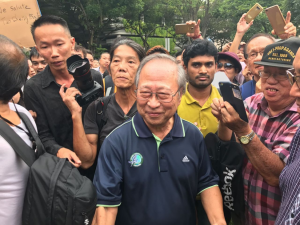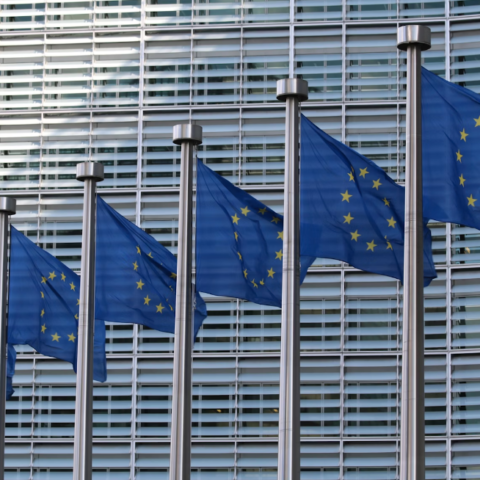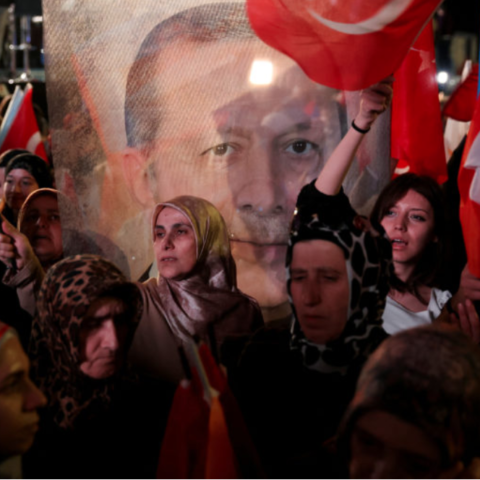As Singaporean President Tony Tan’s term in office was approaching its expiration in 2017, attention turned to the upcoming election in September to elect his successor. Unlike previous presidential elections in Singapore, Prime Minister Lee Hsien Loong declared last year that, following the amendment of the country’s constitution, this election was to be “reserved” for members of the Malay community due to the fact that there had not been a Malay president of Singapore since its first president Yusof Ishak died in 1970. Going forward, a “reserved” election was to be held when a certain minority group (Malay, Indian, etc.) had not held office for five consecutive terms. When the time came to apply for candidacy, the field had narrowed to three candidates (two others had also applied but were excluded since they were not members of the Malay community). The first was Halimah Yacob, a member of the ruling People’s Action Party (PAP) who had served as the Speaker of Parliament since 2013 and was widely considered to be the frontrunner in the race due to her visibility and connections in the government. The second was Salleh Marican, a businessman who founded Second Chance properties, the first Malay-owned business to be listed on the Singapore exchange, and promised to donate all of his presidential salary if he was elected. The third was Farid Khan, another businessman who ran the maritime services firm Bourbon Offshore Asia Pacific and, in order to run for president, had bucked a previous promise to his family to retire. The writ of election was issued on August 28 and, pending the issuance of certificates of eligibility to candidates, the nomination of candidates was to take place on September 13 and the actual election to follow on September 23.
However, a few days prior to nomination day, the Presidential Elections Committee (PEC) revealed that only one candidate, Yacob, was issued a certificate of eligibility. Though the PEC did not publish the reasons why Marican and Khan had failed to qualify, a few different explanations were offered. First, the race was reserved for Malay candidates and both Marican and Khan had faced scrutiny over their identities, with Marican having an Indian father and unable to speak Malay fluently and Khan being identified as Pakistani on his government identification. However, in the PEC’s statement it concluded that Marican and Khan had been issued Malay Community Certificates and thus were deemed Malay. In fact, as later confirmed by the PEC, Marican and Khan had been denied certificates of eligibility because they did not meet the requirement that candidates from the private sector manage companies with at least S$500 million (Singapore dollars) in shareholder equity. As it turns out, Marican’s company and its subsidiaries were valued at around S$258 million while Khan’s was only valued at around S$8 million (although he claimed that altogether his company and affiliates had a shareholder equity value of about S$249 million). Consequently, the election was called off and became a walkover as Yacob, who had met the requirements for public sector candidates due to her years in Parliament, was declared the only eligible candidate and sworn in as president the next day. As the country’s first female and second Malay president in the country’s history, Yacob’s swearing-in was certainly a proud moment for the highly diverse country, with Yacob stating that she wished to act as a “unifying force” in the country.
Regardless of milestones reached when Halimah Yacob became Singapore’s eighth president, the PEC had in effect denied Singaporeans a chance to democratically elect the person who would serve as the country’s head of state and represent Singapore on the international stage. Since 1993, when the position of president was changed from an appointed position to a popularly elected one, only two out of five presidential elections (including the 2017 election) have involved more than one candidate. What is different this time is that this race was limited from the start since it was only open to candidates of Malay ethnicity, who make up around 15 percent of Singapore’s population. PM Lee justified his support for the “reserved” election on the grounds that the president represents “Singaporeans of all races and religions” and that “we have to show this” via ensuring the elections of minorities to high offices. Lee and his PAP had thrown their support behind the idea of a reserved election after a controversial survey carried out by news outlet Channel NewsAsia and the Institute of Policy Studies proclaimed that a majority of Singaporeans wanted someone of their own race to be either PM or president of the country. As a result, because the government assumed that the majority-Chinese country would vote along racial lines, it concluded that the only way to ensure a minority would be elected was to create an election where the only candidates allowed to stand were from a minority group. In contrast to the government’s expectations, the reaction to the survey results was one of suspicion and anger, with many Singaporeans questioning the methods the survey takers used and arguing that the race of a PM/presidential candidate was irrelevant as long as he or she was a “worthy candidate” and worked in Singapore’s best interests.
Aside from the PAP government implying that Singaporeans are behest to tribalism in their preferences for politicians, the changes to the elected presidency which resulted in the reserved had also been criticized due to the lack of citizens’ input on the issue and the perceived involvement of the PAP leadership in determining candidates for the election. When the bill to change the presidential election system was being debated in Parliament late last year, Leon Perera, a member of the opposition Worker’s Party (the only other party besides the PAP to have representation in Parliament), took aim at the PAP for trying to pass the constitutional changes with a referendum. Perera argued that just because citizens voted for the PAP in the 2015 parliamentary election does not mean they wanted them to make such drastic alterations to the constitution without some sort of referendum. Others have criticized Lee and the PAP for stating that 2017 marked five consecutive terms without a Malay elected president, an almost ahistorical assertion since the president was not elected until 1993 and the government counted the appointed Wee Kim Wee (president from 1985 to 1993) as an “elected” president to allow for the 2017 election be “reserved.” Worker’s Party MP Sylvia Lim, responding to the government’s assertion that it counted Wee an elected president on the advice of the Attorney-General’s Chamber, dismissed their claim as a “red herring” and called on the PAP to admit that the creation of a reserved election was merely a “policy decision.” Presidential elections are also supposed to be non-partisan and, though Yacob had resigned from the PAP and her speakership before the election, she had been one of the most prominent members of the party since she entered Parliament in 2001 and was most certainly the party’s “preferred” candidate if there had been a contest.
Though he was happy to congratulate Yacob on her selection as president, former PAP politician Tan Cheng Bock warned that she was assuming the “most controversial presidency in the history of Singapore,” arguing that voters felt “muzzled and angry” and that the elected presidency the PAP advocates so strongly for is no longer serving its purpose. Tan should know: he lost the 2011 presidential election by less than 8,000 votes to the PAP-preferred candidate Tony Tan,

who assumed the presidency with only a plurality of 35 percent. The losing Tan vowed to run again in 2017, to the chagrin of his former party, but as a member of the Chinese community he was robbed of that chance after the constitution was changed to allow for a “reserved” election exclusively for Malay candidates. He had appealed to the government to change the timing of the reserved election so he could participate but was rebuffed by courts multiple times. Many speculated that disallowing Tan the chance to run again was part of the reason why the PAP had campaigned so hard for the election rule change since he was still quite popular and had almost managed to defeat the PAP-favored candidate in the previous election. Following the election, Tan joined a small protest at a park against the walkover election, a rare gesture in a country in which public protesting is limited to one “Speakers Corner” where participants must register with the government ahead of time. As the reaction to Yacob’s installment as president has continuously been negative, Tan and other Lee/PAP opponents who suspect wrongdoing are becoming increasingly willing to speak up on issues, with the phrase “#NotMyPresident” trending in Singapore following the election and protestors warning that PAP “manipulation” will not be allowed to continue forever.
In spite of PM Lee’s and the PAP’s supposed desire to guarantee minority representation via “reserved” elections, they may have set a dangerous precedent for a variety of reasons. First, although Singapore has an elected parliament and regular elections, it is a de facto one party-dominant state where the PAP has ruled uninterrupted since the late 1950s. Due to its parliament having both non-elected members and members elected via multimember winner-take-all districts (where if one party gets a majority in a district with multiple seats, it gets all the seats), Singapore is far from a full democracy and is consistently rated low in areas such as press freedom and internet openness. The elected presidency is a powerful tool by which the public can exercise what little democratic freedom it has and by taking it away the PAP is making it harder to defend the institution, with many in the opposition calling for a return to an appointed presidency if elections cannot be held regularly or impartially. Second, Singapore prides itself on being a meritocracy but the idea of a “reserved” election is far from meritocratic and may actually reinforce stereotypes by insinuating that Malay or Indian candidates can’t win outside of “reserved” elections due to their supposed inferiority. Simultaneously, while the PAP has stressed that having a minority in a position of power like president is important, the fact remains that there has never been a minority PM in the country and the likelihood of there being one in the near future is low. The president does have some power over financial decisions in the country, but the role is largely ceremonial and the real power lies with the PM. As such, minority representation in the presidency is in a way just a sort of tokenism while positions of real power are still held by the Chinese majority. While it is predicted that Singaporeans will “warm up” to Yacob and that they may forget this whole debacle come the next parliamentary election, it cannot be denied that the PAP, in its pursuit to unify the country and help minorities via altering election rules, may have in fact divided the country further.


